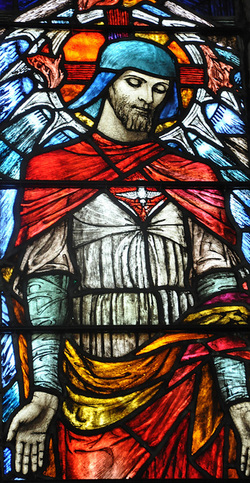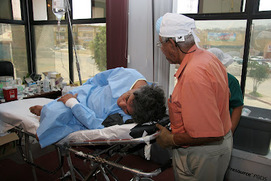Greater than 400 years ago, St. Ignatius Loyola encouraged prayerful reflection on the events of the day to detect God’s presence and discern His direction for anyone through the Daily Examen:
1. Become aware of God’s presence by looking back at the events of day through partnering with the Holy Spirit.
2. Review the day with gratitude by paying attention to the small things.
3. Pay attention to your emotions.
4. Choose one feature of the day and pray from it.
5. Look toward tomorrow and ask God to empower you for the challenges ahead.
Lev. 6-7 has a similar spirit encouraging people to draw close to God in a fresh, pure and authentic way.
If a person lied to his neighbor in regard to something delivered for safekeeping, a pledge, a robbery, extorted from his neighbor or found what was lost, he sinned and became guilty. He would restore its full value plus one-fifth more as restitution to the one it belonged. He brought a ram without defect as a guilt offering to a priest. This atoned and forgave the offender before the Lord (Lev. 6:1-7). Confess your sin to God and restore stolen property with restitution to receive forgiveness from both God and the offended party.
The burnt offering would remain upon the hearth on the altar all night until morning and the fire kept burning. The priest took off his garments, put on other garments and carried the ashes outside the camp to a clean place. Fire would be kept burning continually on the altar (Lev. 6:8-13).
Surrender yourself completely and continuously to God.
Aaron and his sons presented a grain offering before the Lord in front of the altar. They lifted up a handful of fine flour with its oil and incense and offered the grain offering up in smoke on the altar as a soothing aroma to the Lord. Aaron and his sons ate the remainder as unleavened cakes in a holy place. They presented half of the offering in the morning and the other half in the evening. It was prepared and well stirred with oil on a griddle as baked pieces and burned entirely (Lev. 6:14-23). Pray continuously in the power of the Holy Spirit to grow your relationship with God.
The sin offering would be slain in the same place as the burnt offering. The priest who offered it for sin ate it in a holy place. Anyone who touched its flesh became consecrated. The earthenware vessel in which it was boiled would be broken. If boiled in a bronze vessel, it would be scoured and rinsed in water. No sin offering with blood would be eaten, but burned with fire (Lev. 6:24-30). Be broken over sin to maintain experiential peace with God.
The burnt offering and guilt offering was killed in the same place while it its blood was sprinkled around the altar. The priest offered up its fat in smoke by fire as a guilt offering so every male could eat of it. The priest made atonement and presented any man’s burnt offering and grain offering baked in an oven (Lev. 7:1-10). Offer yourself to God without delay to become pure without sin.
A law of sacrifice of peace offerings was offered by way of thanksgiving with unleavened cakes mixed with oil. Present one of every offering as a contribution to the Lord, which belonged to a priest who sprinkled the blood of peace offerings. The flesh of the sacrifice of his thanksgiving peace offering would be eaten on the day of his offering. If any flesh was eaten on third day, he who offered it would not be accepted it reckoned to his benefit. One would not eat any fat or blood of an animal being offered. You would bring fat with the breast and present it as wave offering before the Lord. This was law of burnt offering, grain offering, sin offering, guilt offering, ordination offering and sacrifice of peace offering, which the Lord commanded Moses at Mount Sinai (Lev. 7:11-38). Maintain a fresh relationship with God by appealing to the blood and cross work of Christ.
Practice the five points of the Daily Examen:
1. Become aware of God’s presence by looking back at the events of day through partnering with the Holy Spirit.
2. Review the day with gratitude by paying attention to the small things.
3. Pay attention to your emotions.
4. Choose one feature of the day and pray from it.
5. Look toward tomorrow and ask God to empower you for the challenges ahead.







